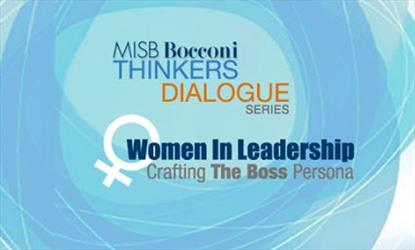
MISB Bocconi, Powai in Mumbai organized the second chapter of "Thinkers Dialogue Series" with senior Women Leaders. The topic in contention was “Women in Leadership – Crafting the Boss Persona.” The aim here was to provide insight about the current scenario of the presence of women in the corporate world and the world’s changing perception. The event was attended by professionals from Banking, Finance, Human Resources and Pharmaceutical industries, who had a vast experience in their respective fields. MISB Bocconi students attended the event with great enthusiasm.
The panel discussion was moderated by Prof. Seema Khanvilkar of MISB Bocconi with the opening address by a Senior Executive Master’s Program candidate – Ms. Bidisha Banerjee, Chief Talent Development - Future Group. Ms. Banerjee spoke about how unlike USA, India has already embraced a woman president but is still a long way from embracing feminism as a normal practice.The panel discussion was initiated by Prof. Khanvilkar with the statement –‘to advance in the business world, women need to adopt male characteristics and repress certain female characteristics’.
While Ms. Tripti Singh, Director at Drishtikon agreed by saying how some women assume male characteristics like assertiveness, aggression to fit into the work environment and make it up the ladder, Ms. Rajashree Nambiar, CEO of India Infoline said that in her 24 years of working in the corporate world she has never had to succumb to such a situation; she added “women are endowed with feminine qualities such as multi-tasking, communication and empathy which could take them to better positions than male qualities would”.
Both parties agreed that it is best to make your own choices and to not be swayed by pressures in the work environment just so as to fit in.The panel moved on to talk about how other priorities such as taking care of a family pulled women back from pursuing their professional careers. Ms. Madhavi Lall, MD Head – HR India at Deutsche Bank believed that such thinking didn’t exist in the present generation of human workforce. But as a society, we were yet to reach there. Several factors such as family expectations, reputation in society, personal goals affected the aspiring woman’s choice.
Ms. Nambiar pointed out that it was quite possible to work and nurture a family simultaneously. She also mentioned that if one of the two didn’t exist, there would be ‘sub-optimality’ in the other. Ms.Tripti Singh pitched in saying that things were changing with the extension of maternity leave from 12 to 26 weeks and the increasing need for paternity leave as well, thereby improving balance between work and home.Prof. Khanvilkar then took the discussion to the next pressing question: Why don’t we see more women at the top? To this, Ms.Nambiar made a profound statement that was never said before: “women are spoiled for choice. They can either work professionally or at home. And when faced with difficulties, they find it easier to buckle in and take the easier way out – leaving”.
She added that we needed to do justice to the education imparted to us and make it worth by finding a job to apply the skills and knowledge acquired. Shanoo Singh, Director Recruitment and Staffing, Asia Pacific at MSD, added that one of the biggest challenges she ever faced was practising gender neutrality. She always faced questions for not letting go of the female employees on grounds of ‘empathy’. Her foundation was “Treat everyone equally, irrespective of gender”.During the Q&A session, several questions were asked; the one that stood out was the ‘Pay Disparity’. While Ms. Lall, Ms.
Tripti Singh and Ms. Shanoo Singh, felt that pay inequality did not exist in the MNCs and that the range of salary depended on the job and not the candidate’s gender, Ms. Nambiar held a different point of view. She said “there is no conscious differentiation in pay between women and men. But the differential creeps in for two reasons: One, there are more men than women at the workplace, so a perception builds that salary does not matter to the women employees as much. Two, women don’t negotiate or bargain hard enough for hard money”.
She concluded saying that we needed to fight to get our pay for the work done and not stay happy with whatever is thrown our way. To summarise, some panellists agreed that the women scenario in the corporate world was getting better, but we had a long way to reach the point of gender neutrality. It closed on a general note advising students to aim for great balance between work and life, not feel pressurised to prove themselves beyond the given job and most importantly, to be themselves. The discussion was a good mix of opinions from female leaders from different industries and the audience going home with contented hearts
Courtesy by www.businesswire.com





